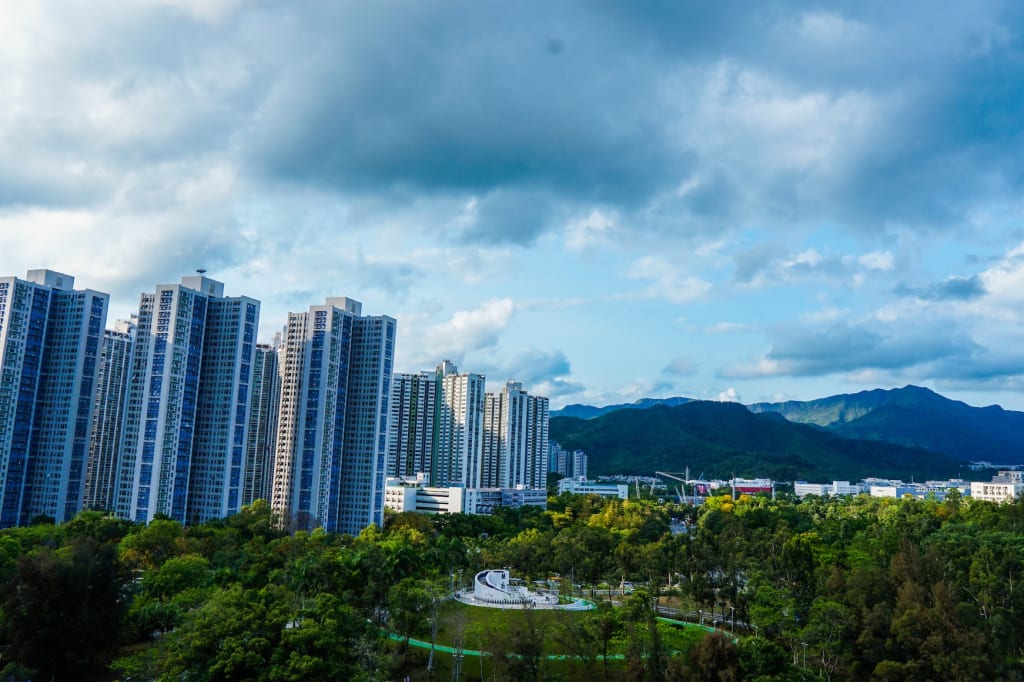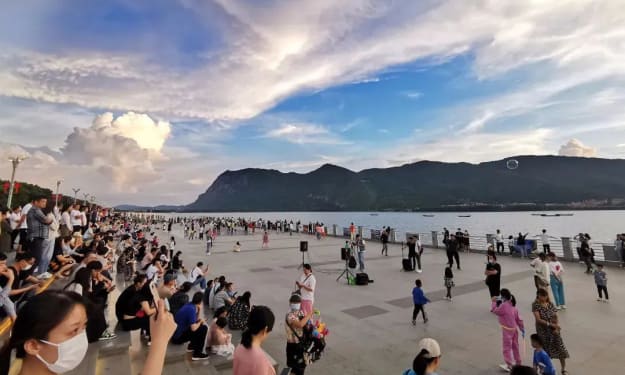Science Fiction Creation, Science Theory and Scientists "theme salon
The expansion of cinematic imagination and sense of the future

On July 22, the theme salon "Science Fiction Creation, Scientific Theory and Scientists" was co-sponsored by the Chinese Science Fiction Research Center and the Social Liaison Department of the Chinese Writers Association (CWA). The salon was organized by Chinese Society of Rock Mechanics and Engineering, co-organized by Geological Society of China and Chinese Society of Mineralogy, Petrology and Geochemistry, with academic support provided by China Writers Network, Dalian University of Technology and Light Reading Club. The event invited a number of domestic scientists, filmmakers, science fiction literature researchers and other guests to share cross-boundary exchanges. Tang Chunan, professor of Dalian University of Technology and chief professor of China University of Geosciences (Wuhan), was the moderator.
At the opening session, Academician He Manchao, Party Secretary and president of Chinese Society of Rock Mechanics and Engineering, delivered the opening speech. According to the science popularization development plan of China Association for Science and Technology, the top-level design of science popularization work is carried out. The integration of science and literature is the embodiment of science spirit and humanity spirit in science fiction works. Hope to make good use of this BBS, strengthen the film and television workers and media workers understanding of major projects in our country, strengthen the understanding of rock mechanics, and the strengthening of the construction of major projects scientists and engineering technical personnel, to produce more and better science and science fiction, promote the development of Chinese science fiction cause high quality development, to build a good science fiction.
In the guest sharing session, Xu Xing, a researcher at the Institute of Vertebrate Paleontology and Paleoanthropology of the Chinese Academy of Sciences and a professor at Yunnan University, presented "What have science fiction brought us? -- From the movie "Jurassic Park" series to speak first. He points out that the contrast between the images of dinosaurs in the film/laboratory scenes not only shocks scientists, but also has a huge impact on the direction of the discipline and the content of research. The combination of science and humanities makes science fiction works have great charm and can stimulate the enthusiasm of the young generation for science fiction. Science fiction, he argues, prompts us to ponder "whether human history is a process of conquest or adaptation".
Xiao Long, professor at China University of Geosciences (Wuhan) and leader of the Chang 'e-3 core scientist team, shared the topic of "Frontier Issues in Planetary Science -- Some Thoughts on science fiction creation". First of all, he takes the hard science fiction elements of Liu Cixin's The Three-Body Problem as an example, and proposes that the solution to the earth crisis is necessary for science fiction. Secondly, he introduced the frontier issues of planetary science, China's lunar and planetary exploration program and other contents, and believed that science fiction creation could be inspired by this, and actively explore the life world and aerospace fields in unknown places. Finally, he pointed out that science fiction is an important force driving scientific and technological progress, and he expected science fiction writers and scientists to collaborate to create more and better works.
Tang Chunan, professor of Dalian University of Technology and chief professor of China University of Geosciences (Wuhan), spoke on the topic of "Science fiction works carry the mission of spreading scientific hypotheses". He explained the "Great Earth cracking" hypothesis and its role in the evolution of the Earth, suggesting that the Great Earth cracking may be the source of the Earth's intrinsic cooling. In his opinion, conforming to scientific principles is the key to science fiction spreading scientific hypotheses, and realistic science fiction is more suitable for spreading scientific hypotheses. Exchanges between scientists and writers should be strengthened, and the country should formulate effective policies and measures to encourage scientists to participate in science fiction creation.
Tang Limei, associate researcher of the Second Institute of Oceanography of the Ministry of Natural Resources and chief science communication expert of natural resources, shares the title "From the Deep Sea to the Antarctic: A wide imagination space for science fiction Creation". She suggested that exotic creatures at the bottom of the sea, such as "hydrothermal organisms", "dark biochains" and "deep biosphere", could provide material for science fiction. The evolution of the Antarctic continent, the story of a team of scientists in extreme cold weather, and monogamous emperor penguins can also be a source of creativity. "Our journey is the sea of stars," said Tang Limei, a researcher who believes that the vast universe and the discovery of thousands of living things can be regarded as part of science fiction creation.
Wang Xiaolu, associate researcher and curator of China Film Art Research Center, gave a speech titled "The Expansion of film imagination and Future consciousness". He believes that, on the one hand, science fiction works are realistic, and only when the creators have both scientific knowledge and strong narrative ability can they create shocking and unique landscapes. On the other hand, as 3D, AR and other technologies gradually penetrate into the film ontology, the relationship between film and science technology and science fiction is increasingly close. Finally, citing the example of scientists and creators co-participating in the script writing of Interstellar, he proposed that filmmakers and scientists should strengthen cooperation to create more works with both social science fiction and scientific science fiction elements.
Wu Yan, professor of Southern University of Science and Technology and distinguished expert of China Science Fiction Research Center, spoke on the topic of "Scientists, Science Fiction and Futurism". He believes that the science fiction futurism of scientists has three characteristics: first, the works are far beyond the scope of the so-called popular science works, and have a futuristic tendency. Secondly, works tend to innovate the way knowledge is produced and used in nature. Thirdly, works promote the acceptance of science by society, especially by teenagers. Therefore, we must pay attention to the futurism conveyed in science fiction works.
The title shared by Silverwing Culture, Real Image partner and film producer Ma Haining is "Disaster-themed sci-fi Ramblings." First, he points to the intersection of science fiction and disaster films, with the Wandering Earth being one of the classic examples. Secondly, he believes that science and technology itself has two sides. On the one hand, scientific and technological progress can prevent disasters to a certain extent. On the other hand, secondary disasters brought by technology are like the sword of Damocles hanging overhead. He proposed that cultural identity innovation can effectively reduce the aesthetic fatigue of disaster-themed sci-fi works.
Li Guangyi, professor of Chongqing University and distinguished expert of China Science Fiction Research Center, delivered a speech titled "Industrial Civilization, Cyberculture and Historical Opportunities of Chinese Science Fiction". Taking many "cyber cities" in China as examples, he proposed that socialist cyber culture is not limited to light, magic and space, but should be an innovative practice that integrates and mobilizes creativity and imagination inside and outside the city. At the same time, he believed that the socialist cyber culture could not simply be transplanted into the European and American cyber culture, but should be based on the universality of industrial civilization and the particularity of China itself, and then grow a socialist cyber culture on the soil of Chinese civilization and in the tide of industrial civilization.
Dai Yaoqin, associate professor of Chinese Language and Literature in Dalian University of Technology and a book reviewer, discussed the "science fiction literature creation idea of the scientific hypothesis of 'the Great Earth crack'" from the perspective of creation in combination with teaching practice, and proposed that science fiction creation can help the construction of "new liberal arts" in universities and the characteristic teaching of creative writing in science and engineering universities. From the discrimination of science fiction/science fiction elements and science fiction/fantasy, she pointed out that science fiction should be scientific and realistic, and then focused on how to establish Chinese characteristics in the creation of Chinese science fiction. Taking THE ORIGINAL Chinese SCIENTIFIC HYPOTHESIS OF "THE GREAT CRACK of THE Earth" AS AN EXAMPLE, SHE EXPLAINS its cohesive scientific and realistic logic of "world construction", and discusses the novel frame design, narrative strategy and cultural elements based on this hypothesis. She stressed that "the inheritance of Chinese science fiction ideas" should also be emphasized.
During the exchange session, the participants actively communicated with the online audience. At the end of the salon, Professor Tang Chunan made a summary speech. He believes that this is a very meaningful cross-boundary exchange. The in-depth dialogue between scientists, science fiction researchers, film practitioners and other guests will provide new ideas for the concept innovation of Chinese science fiction literature and the effective dissemination of Chinese science and culture.





Comments
There are no comments for this story
Be the first to respond and start the conversation.